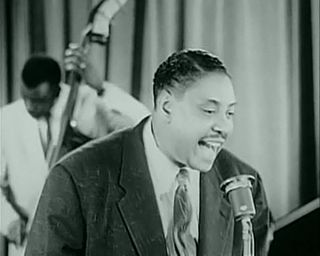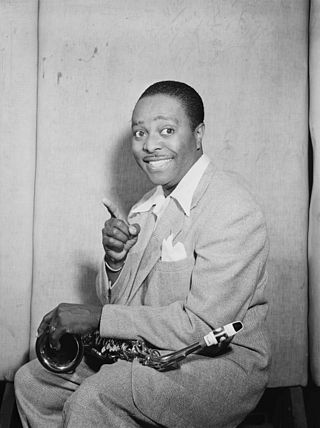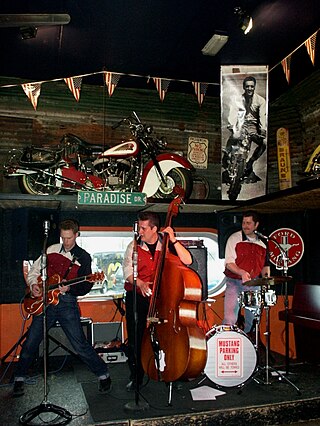Rock and roll is a genre of popular music that evolved in the United States during the late 1940s and early 1950s. It originated from African-American music such as jazz, rhythm and blues, boogie-woogie, gospel, jump blues, as well as country music. While rock and roll's formative elements can be heard in blues records from the 1920s and in country records of the 1930s, the genre did not acquire its name until 1954.

Rhythm and blues, frequently abbreviated as R&B or R'n'B, is a genre of popular music that originated in African-American communities in the 1940s. The term was originally used by record companies to describe recordings marketed predominantly to African Americans, at a time when "rocking, jazz based music ... [with a] heavy, insistent beat" was becoming more popular. In the commercial rhythm and blues music typical of the 1950s through the 1970s, the bands usually consisted of a piano, one or two guitars, bass, drums, one or more saxophones, and sometimes background vocalists. R&B lyrical themes often encapsulate the African-American experience of pain and the quest for freedom and joy, as well as triumphs and failures in terms of relationships, economics, and aspirations.

Charles Edward Anderson Berry was an American singer, guitarist and songwriter who pioneered rock and roll. Nicknamed the "Father of Rock and Roll", he refined and developed rhythm and blues into the major elements that made rock and roll distinctive with songs such as "Maybellene" (1955), "Roll Over Beethoven" (1956), "Rock and Roll Music" (1957) and "Johnny B. Goode" (1958). Writing lyrics that focused on teen life and consumerism, and developing a music style that included guitar solos and showmanship, Berry was a major influence on subsequent rock music.

"Rocket 88" is a song that was first recorded in Memphis, Tennessee, in March 1951. The recording was credited to "Jackie Brenston and his Delta Cats", who were actually Ike Turner and his Kings of Rhythm. The single reached number one on the Billboard R&B chart.

Sixpence None the Richer is an American alternative rock band that formed in New Braunfels, Texas, and eventually settled in Nashville, Tennessee. They are best known for their songs "Kiss Me" and "Breathe Your Name" and their covers of "Don't Dream It's Over" and "There She Goes". The name of the band is inspired by a passage from the book Mere Christianity by C. S. Lewis.

Louis Thomas Jordan was an American saxophonist, multi-instrumentalist, songwriter and bandleader who was popular from the late 1930s to the early 1950s. Known as "the King of the Jukebox", he earned his highest profile towards the end of the swing era. He was inducted into the Rock and Roll Hall of Fame as an "early influence" in 1987.

Chester Arthur Burnett, better known by his stage name Howlin' Wolf, was an American blues singer and guitarist. He was at the forefront of transforming acoustic Delta blues into electric Chicago blues, and over a four-decade career, recorded blues, rhythm and blues, rock and roll, and psychedelic rock. He is regarded as one of the most influential blues musicians of all time.

Rockabilly is an early style of rock and roll music. It dates back to the early 1950s in the United States, especially the South. As a genre, it blends the sound of Western musical styles such as country with that of rhythm and blues, leading to what is considered "classic" rock and roll. Some have also described it as a blend of bluegrass with rock and roll. The term "rockabilly" itself is a portmanteau of "rock" and "hillbilly"; the latter is a reference to country music that contributed strongly to the style. Other important influences on rockabilly include western swing, boogie-woogie, jump blues, and electric blues.
Jump blues is an up-tempo style of blues, jazz, and boogie woogie usually played by small groups and featuring horn instruments. It was popular in the 1940s and was a precursor of rhythm and blues and rock and roll. Appreciation of jump blues was renewed in the 1990s as part of the swing revival.

Ian Andrew Robert Stewart was a Scottish keyboardist and co-founder of the Rolling Stones. He was removed from the line-up in May 1963 at the request of manager Andrew Loog Oldham who felt he did not fit the band's image. He remained as road manager and pianist for over two decades until his death, and was posthumously inducted into the Rock and Roll Hall of Fame along with the rest of the band in 1989.

George "Buddy" Guy is an American blues guitarist and singer. He is an exponent of Chicago blues who has influenced generations of guitarists including Eric Clapton, Jimi Hendrix, Jimmy Page, Keith Richards, Stevie Ray Vaughan, Jeff Beck, Gary Clark Jr. and John Mayer. In the 1960s, Guy played with Muddy Waters as a session guitarist at Chess Records and began a musical partnership with blues harp virtuoso Junior Wells.

"Hound Dog" is a twelve-bar blues song written by Jerry Leiber and Mike Stoller. Recorded originally by Big Mama Thornton on August 13, 1952, in Los Angeles and released by Peacock Records in late February 1953, "Hound Dog" was Thornton's only hit record, selling over 500,000 copies, spending 14 weeks in the R&B charts, including seven weeks at number one. Thornton's recording of "Hound Dog" is listed as one of the Rock and Roll Hall of Fame's "500 Songs That Shaped Rock and Roll", ranked at 318 in the 2021 iteration of Rolling Stone's 500 Greatest Songs of All Time and was inducted into the Grammy Hall of Fame in February 2013.
The origins of rock and roll are complex. Rock and roll emerged as a defined musical style in the United States in the early to mid-1950s. It derived most directly from the rhythm and blues music of the 1940s, which itself developed from earlier blues, the beat-heavy jump blues, boogie woogie, up-tempo jazz, and swing music. It was also influenced by gospel, country and western, and traditional folk music. Rock and roll in turn provided the main basis for the music that, since the mid-1960s, has been generally known simply as rock music.
Michael John "Cub" Koda was an American rock and roll singer, guitarist, songwriter, disc jockey, music critic, and record compiler. Rolling Stone magazine considered him best known for writing the song "Smokin' in the Boys Room", recorded by Brownsville Station, which reached number 3 on the 1974 Billboard chart. He co-wrote and edited the All Music Guide to the Blues, and Blues for Dummies, and selected a version of each of the classic blues songs on the CD accompanying the book. He also wrote liner notes for the Trashmen, Jimmy Reed, J. B. Hutto, the Kingsmen, and the Miller Sisters, among others.

James William McCarty is an American blues rock guitarist from Detroit, Michigan. He has performed with Mitch Ryder and The Detroit Wheels, the Buddy Miles Express, Cactus, The Rockets, the Detroit Blues Band, and more recently, Mystery Train. Since about 2014 Jim McCarty has joined forces with Detroit blues guitarist/songwriter Kenny Parker in The Kenny Parker Band along with several other veteran Detroit blues/rock musicians. He also makes guest appearances with other Detroit bands, most notably for an annual pre New Year's Eve party at one of his favorite clubs, "Callahan's", with The Millionaires, a nine piece jump blues band.

Tess Wiley is an American singer-songwriter.
Ed Wiley Jr. was an American tenor saxophonist whose big sound and soulful expression helped lay the foundation for early blues, R&B and what would later come to be known as “rock-and-roll” music.
Boogie rock is a style of blues rock music that developed in the late 1960s. Its key feature is a repetitive driving rhythm, which emphasizes the groove. Although inspired by earlier musical styles, boogie rock has been described as "heavier" or "harder-edged" in its instrumental approach.

"Rock & Roll" is a song by the Velvet Underground, originally appearing on their 1970 album Loaded. The song was written by the Velvets' leader Lou Reed, who continued to incorporate the song into his own live performances years later as a solo artist.
Status Quo Live at the BBC is series of releases by English rock band Status Quo, issued by Universal Music on 24 October 2010. The release was available on a range of formats: 2-CD 'best of' collection, 4-CD box set and a limited edition collectors' 8-disc complete set.













